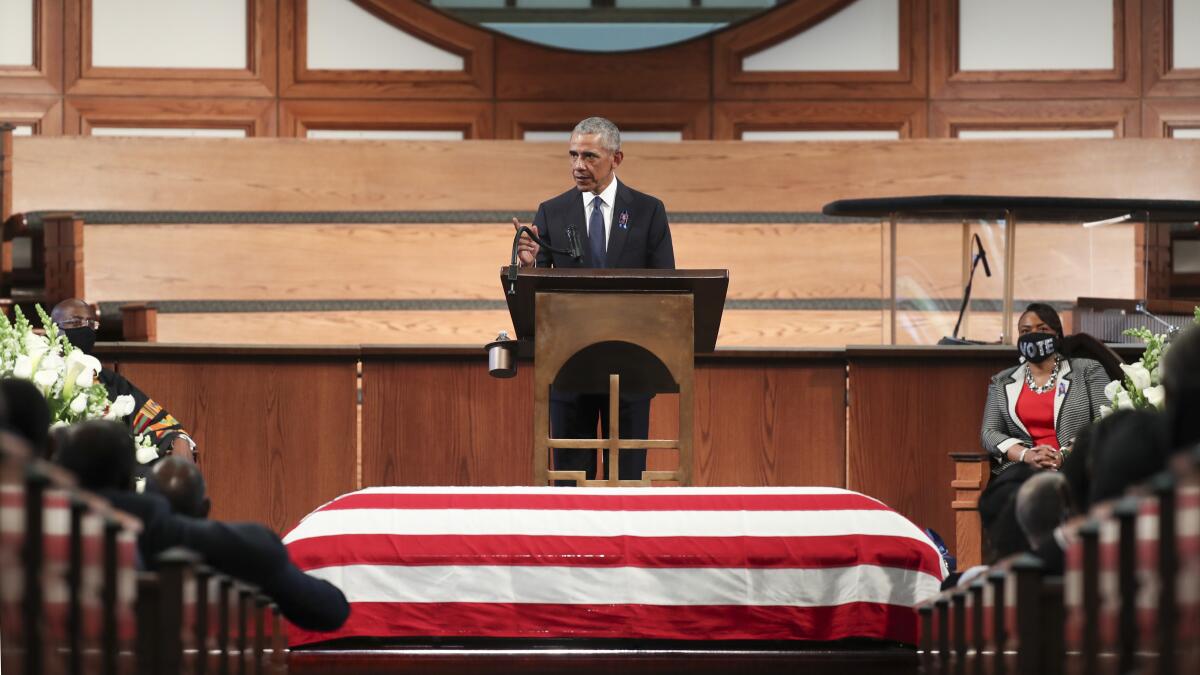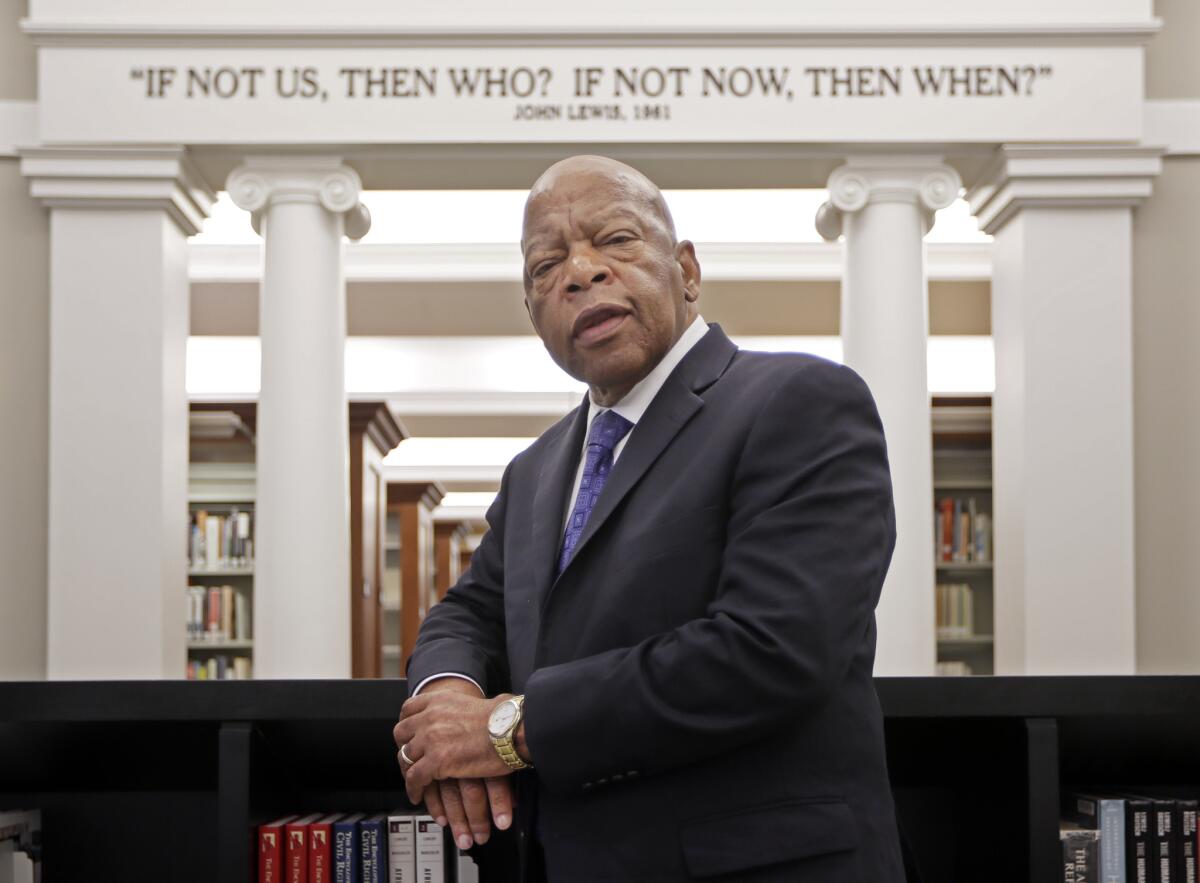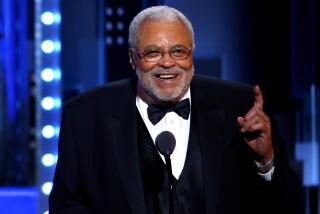Column: John Lewis’ funeral, a rhetorical master class, shows that great speeches still matter

- Share via
Befitting the man it memorialized, Thursday’s funeral of John Lewis in Atlanta was an oratorical symphony, a rhetorical masterwork of pride, praise and calls to continue the great man’s work.
Three former presidents spoke, all with emotional admiration for the 80-year-old civil rights leader and longtime Democratic congressman from Georgia’s 5th District, who died on July 17.
Barack Obama delivered the rousing, heartfelt keynote, in which he called on Americans to pay their respects to Lewis by continuing his work at a time when Black lives and voting rights remain at risk, but Bill Clinton and George W. Bush spoke just as powerfully and well of a man who always put truth before politics.
As did Lewis’ niece Sheila Lewis O’Brien; the Rev. Bernice King; activist Xernona Clayton; the Rev. James Lawson; House Speaker Nancy Pelosi; the Rev. Raphael G. Warnock, senior pastor of the Ebenezer Baptist Church, where the funeral was held; and the others who spoke.
For a country confined by pandemic and, more important, a culture increasingly dependent on often unreliable social media platforms for the exchange of information, ideas, insight and calls to action, it was like a sustained rainfall in the middle of a drought — a reminder of the unique and necessary artistry of the spoken word.
Lewis certainly understood the power of public eloquence; at the age of 15, he famously heard Martin Luther King Jr. speak on the radio and it changed his life.
Arrested 45 times during more than half a century spent fighting for civil rights and beaten unconscious in 1965 on the Edmund Pettus Bridge in Selma, Ala., where he and 600 peaceful protesters marched toward the vicious batons of Alabama state troopers, Lewis was very much a man of action as well as words.
But from his speech before the 1963 March on Washington to a recent Zoom meeting in which he and former President Obama spoke with a group of activists, Lewis was himself such a master of the microphone that when his final essay appeared in Thursday’s New York Times, we could hear his voice as we read.
Quiet, calm and absolutely relentless, Lewis was a tireless and democratic speaker, as comfortable on late-night and morning talk shows as he was in Congress or at any VIP table. He said what he thought — he believed, for instance, that Russian interference in the 2016 election rendered Donald Trump’s presidency illegitimate — and backed it up with action: He did not attend Trump’s inauguration. (Which may be why Trump did not speak at Lewis’ funeral or earlier this week, when Lewis became the first Black lawmaker to lie in state at the U.S. Capitol Rotunda.)
Obviously, no one is going to come to praise and bury John Lewis without preparing the best speech possible.
That kind of preparation — the crafting of tone and phrase, of pause and crescendo; the matching of message with music — has fallen out of favor recently. The turn-of-the-millennium rise of personal narrative as a valid and necessary social force gave us a new vernacular — “authenticity,” which often values the awkward and imprecise over the polished, the raw and emotional over the thoughtfully argued or poetically rendered.
In a 2018 episode of PBS Kids’ series “Arthur,” civil rights leader John Lewis guest-starred as himself to encourage its aardvark protagonist to political action.

Since then, social media has become the preferred manner of social discourse, and with a reliance on immediacy, brevity and niche marketing, much of it is not designed for complex phrasing.
Don’t get me wrong. The validation of personal narratives is one of the biggest cultural revolutions of all time. The definition of what makes anything good or valid, beautiful or important, has long been controlled by a relative few — including those deemed great public speakers. Relaxing the standards of oratory has, like social media, given millions too long kept silent the chance to speak without fear of being disparaged for noneloquence.
Unfortunately, our demand for “authenticity” has been accompanied by a rejection of the carefully considered. Rhetoric, which actually means the art of speaking or writing effectively, is considered elitist by some, synonymous with obfuscation or phoniness by others. Consistent messaging is often dismissed as “talking points” (as if repetition itself implies insincerity), and, as Hillary Clinton found, a ready-made response or speech is often dinged for seeming “over-thought” or “rehearsed.”
Like pretty much everything, oration has long been judged by traditions and preconceptions: Women’s naturally higher-pitched voices kept many of them from lists of great public speakers, and the preference for round vowels eliminates people whose accents do not conform. It’s a talent, like the ability to deliver any great performance, and like any performative talent, it requires experience to perfect. Lewis, as former President Bush remembered on Thursday, began his oratorical career preaching to his chickens.
Still, if you think any of history’s great speeches were not “over-thought” and in some way rehearsed, you’re missing the point. Practice is the mother of authenticity.
Lewis spoke often about the preparation that allowed him and fellow activists to endure the threats and violence they experienced, the rigor that allowed them to overcome natural reactions of fear and rage.
Yes, there are people, born with natural eloquence, who can deliver impromptu words to make you weep or burn to improve the world this minute.
But watching the powerful, loving and rhetorically adept speeches delivered in honor of John Lewis, it was impossible not to also see the time, care and thought that went into them. Were they meticulously crafted and possibly rehearsed? Yes. Were they authentic? Absolutely.
During his eulogy, Bill Clinton recounted asking Lewis about the closest he had ever come to being killed while protesting. Lewis described a moment when, having been knocked down during a demonstration, he saw a man lifting a heavy pipe clearly aimed at Lewis’ head. At the last minute, Lewis turned away and the crowd surged forward, separating the man from him; Lewis considered himself lucky to be alive.
Clinton, however, thought Lewis survived for reasons other than luck. “First, because he was a quick thinker. And second, because he was here on a mission that was bigger than personal ambition.
“Things like that sometimes just happen,” Clinton said, “but usually they don’t.”
More to Read
The biggest entertainment stories
Get our big stories about Hollywood, film, television, music, arts, culture and more right in your inbox as soon as they publish.
You may occasionally receive promotional content from the Los Angeles Times.











